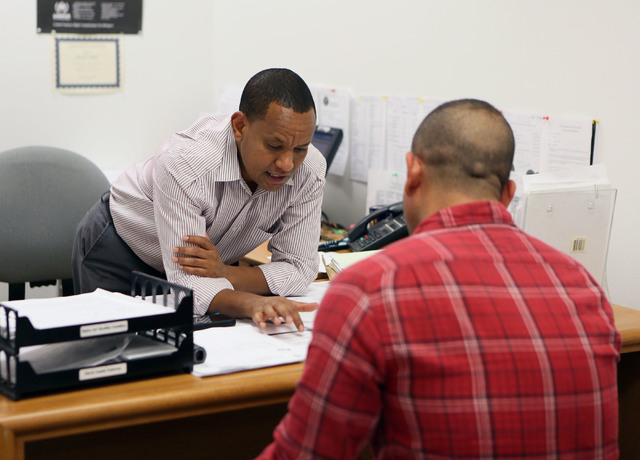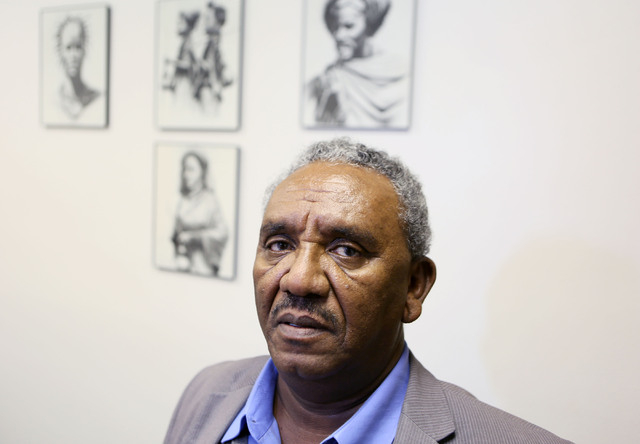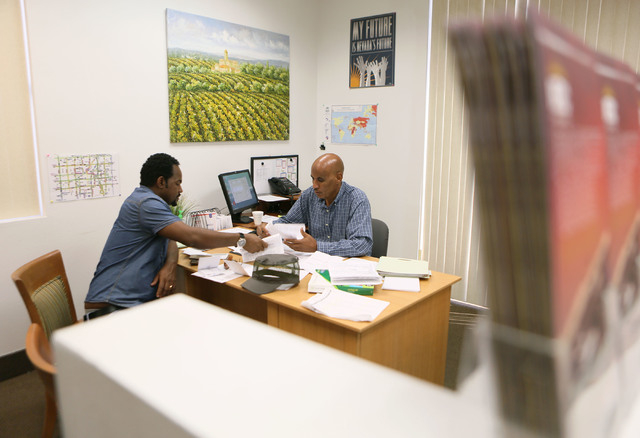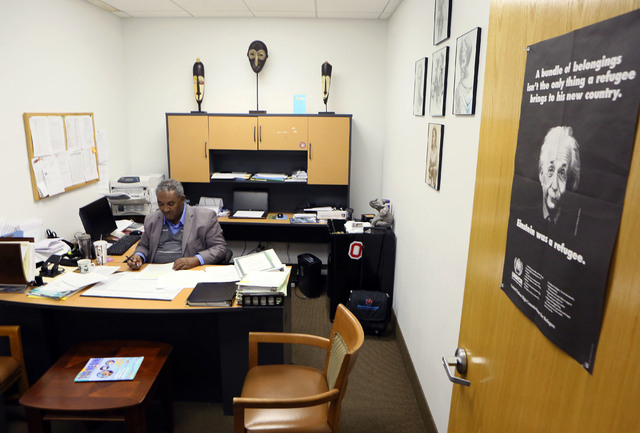Center helps refugees start lives in Las Vegas
The sign on the front of the Ethiopian Community Development Council’s African Community Center, 4534 W. Hacienda Ave., may give the average passerby the impression that the office is a place where Africans gather for social events.
The name does not reflect that the African Community Center is a nonprofit, community-based refugee organization that provides services to legal refugees from anywhere in the world, not just Africa.
Since the center opened in 2003, more than 2,300 refugees resettled in the Las Vegas area, said Redda Mehari, managing director. He estimates that close to 40,000 Ethiopians now call Las Vegas home.
Approximately 50 percent came on diversity visas and 50 percent are refugees, he said.
Southwest valley resident Mehari, 65, came to the United States from Ethiopia on a tourist visa in 1970 to attend the University of the District of Columbia Teachers College in Washington, D.C. After completing his schooling, he returned to his homeland. He later fled to Sudan, applied for refugee status and came to the United States in 1983.
Mehari said his son Hiruy was the first Ethiopian born in Las Vegas in 1984, when Mehari worked for the Catholic Charities of Southern Nevada’s refugee resettlement program.
To be considered a refugee, “you must have fled your country and prove that you have been persecuted because of what you are or what you believe,” said Mehari.
Under United States law, a refugee is someone who: is located outside of the United States; is of special humanitarian concern to the United States; demonstrates he was persecuted or feared persecution due to race, religion, nationality, political opinion or membership in a particular social group; is not firmly resettled in another country; is admissible to the United States.
A refugee does not include anyone who ordered, incited, assisted or otherwise participated in the persecution of any person on account of race, religion, nationality, membership in a particular social group or political opinion.
The U.S. refugee program involves multiple government agencies, five international organizations that operate resettlement support centers around the world and nine domestic nongovernmental, voluntary resettlement support organizations such as the ECDC, which operates the local branch of the African Community Center.
“It is our responsibility to prepare everything for the basic needs of the refugee,” said Mehari. “We pick them up at the airport, take them to an apartment, furnish and stock it with basic food items for at least two to three days,” he said.
Refugees are assigned a case manager who assesses their talents and skills. Cultural orientation, employment services, transportation assistance and translation services are provided by the African Community Center.
“They need to get a job as soon as possible because the funding is very, very limited,” said Mehari.
In the 31 years Mehari has worked in the refugee resettlement arena, first with Catholic Charities now with the ECDC, he has seen the employment rate in Las Vegas drop from 95 percent to “hover around 65 to 70 percent, which is the national average,” he said.
With the capacity to assist 400 refugees per year, the African Community Center has provided help to 283 individuals from Oct. 1, 2013, through July 11. The largest group of 109 is from Cuba. The second-largest is 41 from the African nation of Eritrea, and third is Iraq with 34 refugees. Only eight Ethiopians resettled in this time period.
Misael Hernandez, 38, one of the recent refugees from Cuba, applied for the U.S. refugee program in 2006 and arrived in Las Vegas on Nov. 1, 2013, with his physician wife and their two children, ages 9 and 6.
“They (the Cuban government) denied me (the right) to the university because the university is for revolucionarios, for the communist people,” said Hernandez. “I was in jail several times for my way of thinking.”
Upon his arrival in Las Vegas, he was hired at Bon Breads Baking Co. He now works at the African Community Center as an assistant case manager.
“I want to raise my kids with dignity, and I want the best for them, so I’m trying to do my best,” said Hernandez. “I am grateful to this great nation. They received me like a son. You can get wings here in this country, but you have to learn how to fly by yourself.”
For more information about the ECDC African Community Center and a fundraiser planned for Sept. 11, visit ecdcus.org or call 702-836-3324.

















